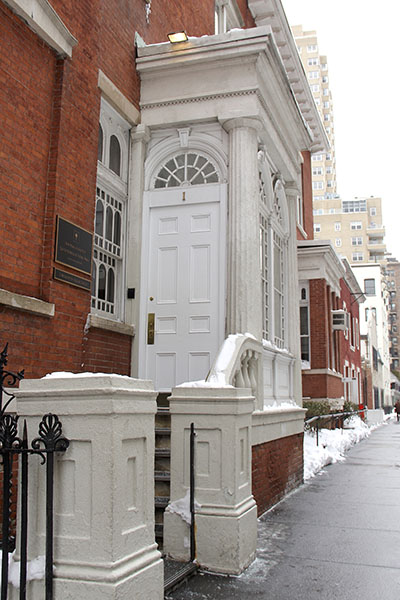EXCLUSIVE: Silver Master’s App Does Away With Criminal Conviction Box
January 27, 2016
Students who wish to pursue a master’s degree with the Silver School of Social Work will no longer need to disclose any prior criminal convictions on the program’s application.
While NYU’s undergraduate Common Application asks applicants to check a box if they have been convicted of a felony, misdemeanor or other crime, Silver’s Master of Social Work application is a separate entity independent of the Common App or NYU’s Office of Admissions.
Silver’s policy change came following student protests regarding the checkbox on undergraduate applications and after, in December, New York City passed the Fair Chance Act — which prohibits employers from asking job applicants about their criminal history until the final stages of the hiring process.
University spokesman John Beckman said that instead of a question about previous convictions, applicants will now find a statement explaining that if students are accepted, they may still face background screenings for field placements or in applying for licensure.
“The Silver School of Social Work decided through a faculty vote in spring 2015 to remove the checkbox from the application form for their Masters of Social Work (MSW) program; they determined that the checkbox was not really being used in admissions decisions for the program,” Beckman said in an email.
Silver alumnus David George began garnering student support for abolishing the box on the MSW application for Fall 2014. He said that asking applicants about previous criminal convictions was counterintuitive to Silver’s mission of assisting underserved communities and instigating social progress.
“I thought that was super hypocritical of us, you know, we’re a field of study that’s pushing for systemic change, specifically within the criminal justice system,” George said.
Silver alumna Nicole McCullough said removing the question from the MSW application was a much needed change which would address existing inequities for people who have prior convictions.
“While many view the box as a standardized application question, it actually serves as a tool which further marginalizes historically oppressed populations, usually communities of color,” McCullough said. “Many applicants with criminal histories often self select out of applying to higher education institutions because these applications require criminal history disclosure. It immediately creates exclusion and deters otherwise qualified applicants. If we remove the box, we eliminate that systemic barrier.”
George agreed and said that as a top tier university, NYU should set the example for other universities in the United States and abroad.
“People should care about this issue because it is something that affects millions and millions of people,” George said. “I think NYU, as an institutional leader, they have a duty to serve everyone educationally, not just folks who have undocumented criminal records.”
Beckman said while NYU cannot single-handedly eliminate the box on its undergraduate application through Common App, Silver’s decision to remove the question from its application is indicative of the university’s concern about the box’s consequences.
“We have revised our admissions practices so that applications are first read checkbox-blind,” Beckman said. “Only after an initial admissions decision has been made do admissions officers look to see if an applicant has checked the checkbox, then those applicants are evaluated by a team of NYU community members who have been trained to reduce unconscious bias.”
Though George is no longer a student at NYU, he said he was pleased with the Silver school’s removal of the box and that he hopes to see similar changes within the institution as a whole.
“Ultimately it’s a very very small step, but it’s a step in the right direction,” George said.
Email Anne Cruz at [email protected].

























































































































































Brian • Jan 28, 2016 at 11:49 am
Great piece!!!